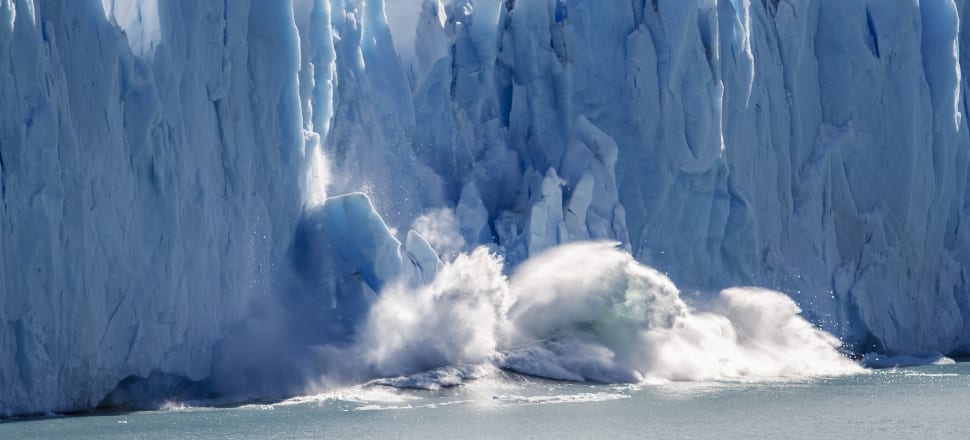
To assume our continued destruction of the planet’s life-supporting systems could lead to any other outcome than collapse is irrational. But, as writes Catherine Knight, the prospect of a 'great unravelling' does present an opportunity.
Opinion: Is there anything more terrifying than the prospect of global collapse in the near future? Yes, undoubtedly: the possibility that collapse is already happening but we just don’t realise it.
‘Collapse’ used as a simple unmodified noun refers to the complete breakdown of society as we know it. It may be precipitated by climate change, but it could also be triggered by any number of other crises, including another, even more brutal pandemic than Covid-19, a global financial crash or sudden energy disruption. Or a combination of some or all of these.
The cause is almost academic, because all of these things are related. They are all symptoms of a single problem, which is that humans (and especially high-income nations) are overshooting the planet’s ability to regenerate and self-regulate, fuelled by the one-off bonanza of fossil fuels, which have allowed us to produce and consume more (and pollute more) than any other time in history.
READ MORE: * The transition to an ‘economy of enough’ * A pathway out of environmental collapse
We know that in respect of climate change alone, we will reach a point at which disruption to the climate and planetary systems can no longer be reined in. Scientists warn that surpassing 1.5C could trigger a cascade of tipping points, which would irreversibly alter the global climate system and further accelerate warming. At global warming of around 2.7C (what we are on track for under current policies), a third of the world will exit the ‘human climate niche’ – in other words, be marooned in places unsuitable for human survival. But long before that, the geopolitical fractures will become evident. Conflict over dwindling resources will erupt and the exodus of humanity from these regions will become a torrent – well beyond any country’s ability to absorb.
But surely, if collapse – or ‘the great unravelling’ as it is also known, was happening, we would know? Not necessarily. That is because many of us, most of the time, do not think in systems. We hear alarming news items about this or that, but generally do not connect things. Or we are so absorbed in our everyday lives, we simply do not notice change at all.
So let’s take a few examples:
Earlier this month, the world experienced the warmest global average temperatures on record, with scientists predicting that July 2023 will be the hottest month ever (‘ever’ being since the Eemian interglacial period 120,000 years ago). Meanwhile, fuelled by drought and high temperatures, forest fires in Canada rage on, shattering historic records in their number, size and destructiveness, and choking cities as far away as New York with thick smoke.
We continue to suffer the prolonged effects of the pandemic that brought the global economy to a standstill and led to the deaths of approximately 15 million people, but the likelihood of another pandemic hitting, even before Covid-19 has fully faded is high. Scientists warn that the number of new infectious diseases with epidemic potential has increased nearly four-fold in the past six decades. That is because zoonosis (infectious disease that jumps from non-human animals to humans) is directly linked to continued habitat destruction, bringing humans and wildlife closer together.
Globally, human wellbeing, as measured by the Human Development Index (a composite of life expectancy, education and per capita income indicators) has seen a decline for two years in a row – for the first time since 1990 when it was first measured by the United Nations. Although this decline has been attributed to the Covid-19 pandemic, much of the data for 2020 was collected before the pandemic struck, signalling a deeper, more systemic issue.
We are seeing rising infertility rates in the industrialised world, with one in 10 children born with assisted reproduction, linked to micro-plastics and other toxic chemicals in our environment.
Even a casual familiarity with global history will make clear that civilisations just as sophisticated and complex as ours have collapsed – to think that we are somehow immune to this eventuality is ignorance and hubris at its most extreme.
And related to the above, in New Zealand’s oceans, a recent study found that 75 percent of commercially-caught fish destined for human consumption contained microplastics.
Back on land, road networks in parts of our country remained broken and impassable in the wake of storms over the last year, and countless families remain in limbo after their homes were damaged beyond repair. Climate scientists warn us that such extreme weather will increase in frequency and magnitude, meaning we are likely to see a pattern of compounding damage as each weather event hits before the damage of the last one is repaired. It is also likely that some time in the not-so-distant future, home and business owners in some parts of the country will no longer be able to insure themselves fully from extreme weather, as insurers withdraw from the market.
On top of the cost of insurance (already unaffordable for many), the cost of living continues to spike (by nearly 8 percent in the year to March), driven by increases in groceries, rent and interest payments, and is likely to continue to rise as interest rates and petrol prices go up.
Housing deprivation is another fissure that risks becoming a gaping crevasse. The Human Rights Commission has detailed how housing affordability has plummeted in the past three decades, and many homes are making people sick due to mould and damp. According to 2018 figures, at 102,000 souls, New Zealand had enough homeless people to populate a city the size of Dunedin – a 150 percent increase since these numbers were last estimated.
And perhaps not surprisingly, given all the above, depression and mental illness are at all-time highs, pushing underfunded support services to breaking point.
If we know where to look, the signs that all is not well are everywhere. I only have to walk a few hundred metres from my home to find a sign warning of the presence of toxic algae in the river – in the middle of winter!
But sometimes we don’t even notice, because the shifts are happening beyond our life horizon. This phenomenon is called the ‘shifting baseline syndrome’ and a good example is the ‘windshield phenomenon’, often cited as the sign of dramatic collapse of insect populations, including the pollinators on which all agriculture depends. Anyone born in 1980s or earlier will remember that a trip in the car would involve vigorous cleaning of the windscreen as it became peppered with bugs that had come to an unfortunate end. But if you were born towards the end of last century, you will know nothing other than windscreens with a sparse splatter, even after a long trip in the country. This shows how the baseline against which we measure environmental decline is often distorted – because often we measure from a state of severe degradation.
Taken in isolation, all of these things might seem ‘a bit bad’ but not overwhelming. Taken as multiple indicators of a global system that is starting to break down, they are alarming to the core, because they indicate that the collapse has probably already begun.
But if that is the case, then the more alarming reality is that despite this, our Government, and most governments around the world are acting as though it is business as usual. Yes, they recognise that climate change is an issue, but most political leaders appear to still be convinced that by transitioning to renewable energy and more energy-efficient technologies we will be saved from catastrophic climate change and global collapse. This is referred to as green growth, the central tenet of which is that we can decouple economic growth from climate emissions (though all the other environmental harms of growth are rarely mentioned). There is one glitch. There is absolutely no empirical evidence that this decoupling can and will happen at a rate and scale sufficient to stabilise the climate. Green growth is magical thinking at its most unethical, but persists because this is where the money is.
And if you are thinking: but it can’t possibly be this dire, surely our political and economic leaders would be telling us if so? That is certainly an understandable expectation, and it is what lulls most of us into a sense of security that ‘things are under control’ – someone, somewhere has got the answers. But political leaders know that irrespective of the doubts they may reveal in private, declaring these concerns to the electorate will lose them votes, big time. Business and industry leaders know that whatever disquiet they may feel, for the sake of their shareholders and their own salaries and lifestyles, they must cling to the current model – extracting whatever profit they can while the sun shines. In a capitalist system, there is no money to made from facing up to limits or curbing excess.
Taken in isolation, all of these things might seem ‘a bit bad’ but not overwhelming. Taken as multiple indicators of a global system that is starting to break down, they are alarming to the core, because they indicate that the collapse has probably already begun.
The media plays a part in supporting the mirage of ‘everything is okay-ism’. Following the record-breaking temperatures earlier this month, the closest figure we have to a global leader, the UN Secretary General Antonio Guterres, desperately warned "If we persist in delaying key measures that are needed, I think we are moving into a catastrophic situation..." This warning should have been front and centre of every news bulletin, every front page the world over because runaway climate change is an existential threat to human civilisation as we know it. It is not a hypothetical, it is what is on track to happen if we continue on the current path. But existential threats don’t sell – breathless puff pieces about the latest ‘breakthrough technology’ that promises to be humanity’s salvation do.
And yes, as catastrophic climate change beds in, we are living in one of the better places in the world according to recent research. But to think that we will be immune to global economic collapse, mass human migration and, likely, geopolitical conflict at a scale that we hoped we would never see again, then we are deluding ourselves. At the very least, at the end of a very long supply chain, we need to get used to getting by without resources that we now take for granted.
So where does this leave us? What can we do? I suggest a simple solution. Start using the ‘c’ word. No, not cancer (though that is scary too and not unrelated to this discussion), and not that word either. The word ‘collapse’. Not in a panicked, chicken-licken kind of way (though we would be absolutely justified in doing so), but in a measured, matter-of-fact way. Because to assume our continued destruction of the planet’s life-supporting systems could lead to any other outcome is irrational.
Above all else, we need to be raising awareness that things are not ‘business as usual’. We need to penetrate through the miasma of delusion that our civilisation is much too sophisticated to collapse. Even a casual familiarity with global history will make clear that civilisations just as sophisticated and complex as ours have collapsed – to think that we are somehow immune to this eventuality is ignorance and hubris at its most extreme.
We can let this happen in a chaotic, brutal way as the climate extremes bear down on us more and more frequently, with compounding damage to our homes, communities, infrastructure and lifelines, as the climate refugees start to inundate our shores, as inequality, crime and social disintegration reach breaking point, or when the next pandemic strikes. Or we can urge our government to embrace the guiding principle of sufficiency in all its economic policies, while shoring up the social infrastructure we will need to promote and support the wellbeing of all New Zealanders, including the most vulnerable.
Those of us who have the latitude can do this in our own spheres of influence by slowing down, consuming less, choosing not to fund destructive, extractive industries through our purchases, reaching out to the people we care for or who need support, and by reconnecting with the local, building resilience into our lives and our communities.
Above all, the prospect of collapse is an opportunity. Just like a life-threatening illness, it should stop us in our tracks, to fundamentally re-evaluate what really matters in our lives. For most of us, it will be sustenance, warmth, connection with those we love, and the ability to find joy and laughter in everyday things. We can have all this with much simpler lives which don’t cost the earth.







